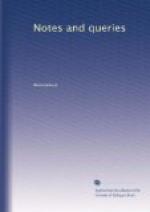Edward F. Rimbault.
* * * * *
IS THE DOMBEC THE DOMESDAY OF ALFRED?
I beg to propose the following “Query":—Is the Dombec, a work referred to in the Laws of Edward the Elder, the same as what has been called the Domesday or Winchester Book of Alfred the Great? I incline to think that it is not, and shall be much obliged to any of your correspondents, learned in the Anglo-Saxon period of our history, who will give himself the trouble of resolving my doubts.
Sir Henry Spelman, in his Glossary voce Dombec, calls it the Liber Judicialis of the Anglo-Saxons; and says it is mentioned in the first chapter of the laws of Edward the Elder, where the king directs his judges to conduct themselves in their judicial proceedings as on [Old English: thaere dom bec stand], that is, as is enjoined in their Dome Book.—“Quod,” he continues, “an de praecedentium Regum legibus quae hodie extant, intelligendum sit: an de alio quopiam libro hactenus non prodeunte, incertum est.”
But this uncertainty does not seem to have attached itself to the mind of Sir William Blackstone; for in the third section of the Introduction prefixed to his Commentaries on the Laws of England, he informs us that our antiquaries “tell us that in the time of Alfred, the local customs of the several provinces of the kingdom were grown so various, that he found it expedient to compile his Dome Book, or Liber Judicialis, for the general use of the whole kingdom.” This book is said to have been extant so late as the reign of King Edward IV., but is now unfortunately lost. It contained, we may probably suppose, the principal maxims of the common law, the penalties for misdemeanors, and the forms of judicial proceedings. Thus much may be at least collected from that injunction to observe it, which we find in the Laws of King Edward the Elder, the son of Alfred.—“Omnibus qui reipublicae praesunt etiam atque etiam mando, ut omnibus aequos se praebeant judices, perinde ac in judiciali libro (Saxonice, [Old English: dom bec]) scriptum habetur: nec quidquid formident quin jus commune (Saxonice, [Old English: folcrihte]) audactes libereque dicant.”
But notwithstanding this, it appears to me by no means conclusive, that the Dombec referred to in the Laws of Edward the Elder and the Liber Judicialis of Alfred are the same; on the contrary, Alfred’s Liber Judicialis seems to have been known not under the name of Dombec, but under that of the Winchester Roll, from the circumstance of its having been principally kept at Winchester: and Sir Henry Spelman says, the Domesday Book of William the Conqueror was sometimes called Rotulus Wintoniae, a similitudine antiquoris, from its resemblance to an older document preserved at Winchester. And he quotes Ingulphus Abbot of Croyland, who says, “Iste rotulus (i.e. the Domesday Book of William)




